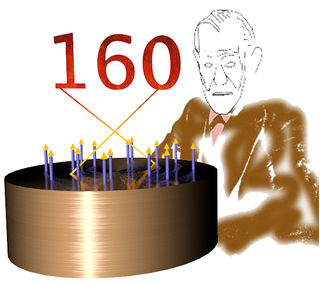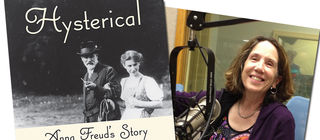Freudian Psychology
Sigmund Freud Had Penis Envy
And 9 other skeletons in his closet.
Posted May 2, 2016 Reviewed by Ekua Hagan

May 6th is Sigmund Freud's 160th birthday. Let's start the celebration with some secrets. Freud had plenty. Some were about his own sexuality. Some were about his sons'. Some were about the sexuality of his daughter, Anna, who was a famous psychoanalyst in her own right.
I'm a science journalist (Scientific American, Discover Magazine, The Chicago Tribune, Vermont Public Radio, nationally broadcast television documentaries, and a host of radio and regional newspapers). Intending to write a joint biography of Sigmund and Anna Freud, I found that the very papers of Anna's that I wanted to examine are kept under lock and key by The Freud Archives. And so I spent nine years researching a fact-based novel about Anna and what it must have been like for her to grow up as the lesbian daughter of a highly revered thinker who had pronounced lesbianism a gateway to mental illness.
Apparently, Freud was an "interesting" father in more ways than one. From my notes:
- Even Freud had penis envy. When he was an old man and very ill from the mouth cancer that would soon kill him, he had a surgery on his testicles in hopes of curing his impotence.
- Freud believed that "shorter is better." But that belief wasn't about male genitalia or cigars. It was about jokes. Freud so loved humor that he wrote Wit and Its Relation to the Unconscious, which has real merit as psychoanalytic theory, as an ethnography of humor, and as a joke book.
- Freud had sister-wives. His wife Martha’s sister, Minna Bernays, lived with the Freud family for decades. According to Carl Jung, Minna once tearfully confided in him about her affair with Sigmund. Jung outlived Freud by a long shot. Once Freud died, Jung exposed the secret he'd protected. But the psychoanalytic community pooh-poohed his claim as an expression of sour grapes about his own painful expulsion from Freud’s inner circle. Proof surfaced more than four decades after Jung's death. In 2006, the guest log of an Alpine Inn was found. Minna was often Freud's traveling companion; his wife altogether refused to travel. The inn's guest log showed that Freud and Minna checked into the inn's honeymoon suite for a two-week stay. During the stay, Freud wrote to his wife complaining that he and Minna had to make do in their two drastically sub-par (and, of course, separate) rooms.
- So it shouldn't be surprising that the one joke that Freud seems to have originated is this: "A wife is like an umbrella. Sooner or later, you take a cab."
- Freud was disappointed in his grown sons. Martin, the eldest, was a case of "arrested development," sleeping with many women indiscriminately. His youngest son, Ernst, suffered from crippling agoraphobia. And his relationship with his middle son, Oliver, was forever compromised after an encounter with the teenage Oliver in which Freud scolded, "A gentleman must never do such things, not even subconsciously." There's no record of what Oliver did that prompted the scolding.
- "Don't try this at home." Freud referred Oliver to a friend for analysis. But even though he warned his disciples that analysis is too erotic an arena to risk with a family member, he analyzed his daughter Anna. By my count, the analysis went on for at least 1,000 clinical hours. What did they talk about? We know one topic from a paper called "A Child Is Being Beaten," which Freud presented at a congress just two years after Anna's analysis began. He and Anna discussed Anna's masturbation fantasies, ones in which she was beaten by an enraged father figure who was angry over an infraction that wasn't her fault. Was that "infraction that wasn't her fault" an allusion to Anna's lesbianism? There's no telling for sure. But it seems likely. Anna died at age 82 still "in the closet"—which is to say that, though she spent her last 54 years living with Dorothy Burlingham, heir to the Tiffany fortune, no one but Dorothy's four children knew for sure what the nature of the two women's relationship was. On his deathbed, one son revealed the secret that his two mothers had been spouses in every sense of the word.
- Some of Freud's theories were inspired by the writings of Charles Darwin. Freud was thrilled to imagine the implications of the idea that we humans are evolved from apes. Quite reasonably, he surmised that if our physical characteristics have evolved from those of primates, perhaps our emotional selves have, too. This line of reasoning gave rise to Freud's theory of the castration complex as the font of morality.
- Freud believed that boys learn right from wrong as a result of subconscious racial memories of witnessing father apes castrating their sons for even minor infractions.
- Having no protuberant genitalia to protect, girls never acquire morality and need guidance from fathers and, later, husbands.
- The female counterpart to the castration complex is penis envy. After realizing that she doesn't have a penis, a maturing girl begins to covet her father's penis. When she realizes that she can't have his, she wants babies. Whereas men are predestined to become increasingly moral, women are predestined to lie and connive in order to get a man to impregnate them—and, of course, give them moral guidance. The lack of governance from a husband is what makes lesbians emotionally fragile.
All this being said, compared to his contemporaries, Sigmund Freud was indeed the compassionate, forward-thinking physician that some commentators will no doubt praise on May 6. Freud became a doctor at a time when lesbianism and masturbation both were considered symptoms of hysteria. Many doctors treated hysteria with opiates, ovariectomies, and clitoridectomies. At least Freud treated hysterical women only by talking to them. To his great credit, he urged all of his patients to look inside themselves and marvel at what they found. As problematic as details of his life and theory were, his idea that physical illnesses can be caused by emotions was a remarkable gift to humankind.

Much more information about Sigmund and Anna is in my fact-based novel, Hysterical: Anna Freud's Story (She Writes Press, 2014), which Booklist called “avidly researched, shrewd, and unnerving [and] complexly entertaining, sexually dramatic, and acidly funny.” LAMBDA Literary wrote that it’s got “a plot so rife with tension it’ll make you squirm.” Oprah recommended it in the June 2014 issue of O, The Oprah Magazine.


